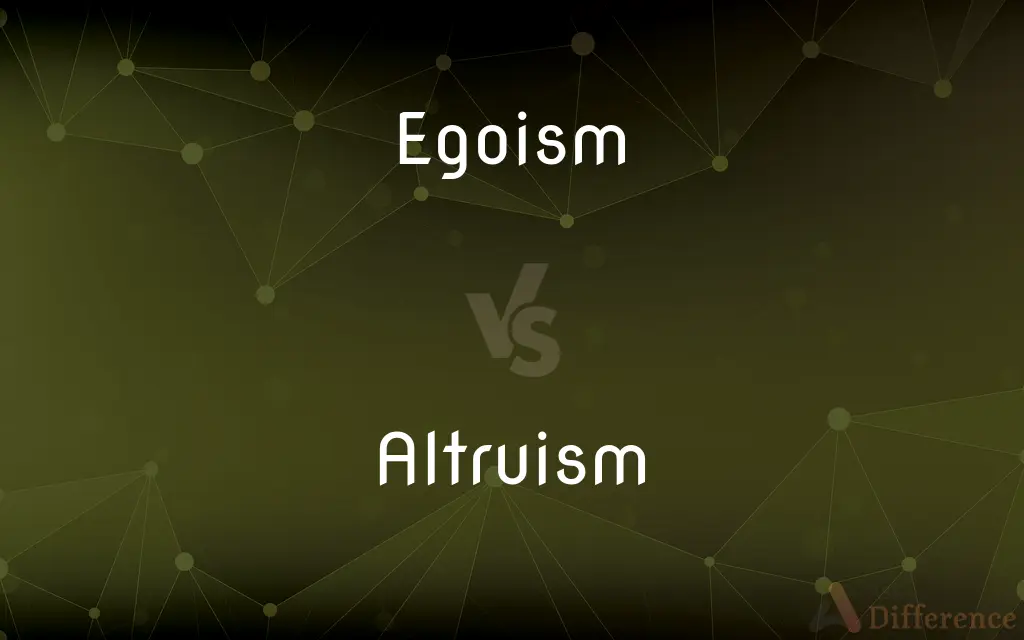Egoism vs. Altruism — What's the Difference?
Edited by Tayyaba Rehman — By Urooj Arif — Updated on March 26, 2024
Egoism focuses on self-interest as a moral guide; altruism emphasizes selfless concern for others.

Difference Between Egoism and Altruism
Table of Contents
ADVERTISEMENT
Key Differences
Egoism posits that actions are morally right if they benefit the self, suggesting that self-interest drives moral behavior. In contrast, altruism prioritizes the well-being of others over one's own, advocating for acts of kindness without expectation of personal gain.
Egoism operates on the principle that individual self-interest is the foundation of morality, implying that moral decisions should enhance the individual's own well-being. Altruism, however, argues that moral value is derived from promoting the happiness and interests of others, often at one's own expense.
In the context of decision-making, egoism supports choices that maximize personal advantages, which could lead to competitiveness or individualism. Altruism, on the other hand, encourages decisions that contribute to the welfare of others, fostering cooperation and empathy within communities.
Egoism and altruism also differ in their views on human nature and societal contribution. Egoists may see their approach as realistic and suited to a competitive world, whereas altruists believe in the importance of selflessness for societal harmony and progress.
Comparison Chart
Core Principle
Self-interest is the basis of moral action.
Concern for others' welfare is the basis of moral action.
ADVERTISEMENT
Decision-making
Choices are made to benefit oneself.
Choices are made to benefit others, often at a cost to oneself.
Societal View
Advocates for individualism and personal success.
Promotes cooperation and empathy towards others.
Philosophical Basis
Often linked to ethical egoism and rational self-interest.
Associated with utilitarianism and moral altruism.
Impact on Behavior
Encourages competitiveness and self-reliance.
Fosters generosity and community-mindedness.
Compare with Definitions
Egoism
Egoism emphasizes the importance of the individual over the collective.
Prioritizing personal goals over group objectives.
Altruism
Altruistic actions often involve a sacrifice of personal interests.
Giving up time or resources to help a friend in crisis.
Egoism
Egoism suggests that acting in one's own interest is morally right.
An entrepreneur pursuing personal success may embody egoistic principles.
Altruism
Altruism focuses on the happiness and well-being of others.
Donating to charity to support those in need.
Egoism
Egoism may encourage a competitive approach to life.
Competing vigorously for a promotion to advance one's own career.
Altruism
Altruism fosters a sense of community and empathy.
Supporting a colleague's project for the greater good of the team.
Egoism
Egoism often aligns with the belief that pursuing one's self-interest is rational.
Choosing a job for its high salary and personal growth opportunities.
Altruism
Altruism is considered morally virtuous, emphasizing generosity and selflessness.
Adopting a pet from a shelter to provide it with a loving home.
Egoism
Egoism can provide a moral justification for self-centered actions.
Investing in one's own education and career for personal advancement.
Altruism
Altruism advocates for actions that benefit others, without seeking personal gain.
Volunteering at a shelter without any expectation of reward.
Egoism
Egoism is the philosophy concerned with the role of the self, or ego, as the motivation and goal of one's own action. Different theories on egoism encompass a range of disparate ideas and can generally be categorized into descriptive or normative forms.
Altruism
Altruism is the principle and moral practice of concern for happiness of other human beings or other animals, resulting in a quality of life both material and spiritual. It is a traditional virtue in many cultures and a core aspect of various religious traditions and secular worldviews, though the concept of "others" toward whom concern should be directed can vary among cultures and religions.
Egoism
The doctrine that human behavior is motivated by self-interest.
Altruism
Unselfish concern for the welfare of others; selflessness.
Egoism
The belief that self-interest provides the proper basis for moral behavior.
Altruism
(Zoology) Instinctive behavior that is detrimental to the individual but favors the survival or spread of that individual's genes, as by benefiting its relatives.
Egoism
Egotism; conceit.
Altruism
Regard for others, both natural and moral without regard for oneself; devotion to the interests of others; brotherly kindness.
Egoism
The tendency to think selfishly with exclusive self-interest in mind.
Altruism
Action or behaviour that benefits another or others at some cost to the performer.
Egoism
(ethics) The belief that moral behavior should be directed toward one's self-interest only.
Altruism
Regard for others, both natural and moral; devotion to the interests of others; brotherly kindness; - opposed to egoism or selfishness.
Egoism
Egotism tendency to talk excessively about oneself.
Altruism
The quality of unselfish concern for the welfare of others
Egoism
The doctrine of certain extreme adherents or disciples of Descartes and Johann Gottlieb Fichte, which finds all the elements of knowledge in the ego and the relations which it implies or provides for.
Egoism
Excessive love and thought of self; the habit of regarding one's self as the center of every interest; selfishness; - opposed to altruism.
Egoism
Attempting to get personal recognition for yourself (especially by unacceptable means)
Common Curiosities
What is altruism?
Altruism is the principle or practice of concern for the welfare of others, often at one's own expense.
How do egoism and altruism differ in their approach to morality?
Egoism bases morality on self-interest, while altruism finds moral value in acting for the benefit of others.
What is egoism?
Egoism is the ethical stance that actions are morally right if they benefit oneself.
Does altruism always require sacrifice?
Not always, but altruism often involves prioritizing others' needs over one's own, which can entail sacrifices.
How do egoists view altruistic behavior?
Egoists might view altruistic behavior as irrational or as not maximizing personal welfare.
How does society view egoism and altruism?
Society often views altruism positively, as it benefits the community, while egoism receives mixed perceptions, depending on its impact on others.
Is it possible to be both egoistic and altruistic?
Yes, individuals can exhibit a mix of egoistic and altruistic behaviors, balancing self-interest with concern for others.
Can egoism lead to positive outcomes?
Yes, egoism can lead to innovation and personal success, benefiting society indirectly through advancements and contributions.
Can altruistic actions benefit the altruist?
Yes, altruistic actions can lead to psychological satisfaction and social recognition for the altruist.
What ethical theories are associated with egoism?
Ethical egoism and rational self-interest are theories associated with egoism, promoting actions that advance one's own interests.
Can altruism be detrimental?
Excessive altruism, or selflessness at the expense of one's own well-being, can be detrimental to the individual.
Are there psychological theories supporting altruism?
Yes, several psychological theories, such as empathy-altruism, suggest that people can act altruistically motivated by empathy.
Are there cultural differences in the perception of egoism and altruism?
Yes, cultural values and societal norms significantly influence the perception and practice of egoism and altruism.
What ethical theories support altruism?
Utilitarianism and moral altruism are theories that support altruistic behavior, emphasizing the greatest good for the greatest number.
How do egoism and altruism influence decision-making?
Egoism influences decision-making towards personal gain, while altruism guides decisions to benefit others, possibly at a personal cost.
Share Your Discovery

Previous Comparison
Snitch vs. Rat
Next Comparison
Sleigh vs. SledAuthor Spotlight
Written by
Urooj ArifUrooj is a skilled content writer at Ask Difference, known for her exceptional ability to simplify complex topics into engaging and informative content. With a passion for research and a flair for clear, concise writing, she consistently delivers articles that resonate with our diverse audience.
Edited by
Tayyaba RehmanTayyaba Rehman is a distinguished writer, currently serving as a primary contributor to askdifference.com. As a researcher in semantics and etymology, Tayyaba's passion for the complexity of languages and their distinctions has found a perfect home on the platform. Tayyaba delves into the intricacies of language, distinguishing between commonly confused words and phrases, thereby providing clarity for readers worldwide.
















































